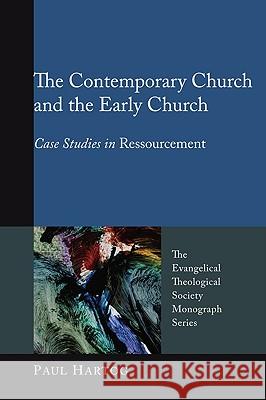The Contemporary Church and the Early Church » książka
The Contemporary Church and the Early Church
ISBN-13: 9781606088999 / Angielski / Miękka / 2010 / 249 str.
The Contemporary Church and the Early Church
ISBN-13: 9781606088999 / Angielski / Miękka / 2010 / 249 str.
(netto: 142,30 VAT: 5%)
Najniższa cena z 30 dni: 146,94
ok. 16-18 dni roboczych.
Darmowa dostawa!
As ""evangelicals"" face future challenges, many are turning back to the ancient church for inspiration. But these ancient-future approaches remain diverse and sometimes even at odds with one another. This volume demonstrates and analyzes the complexity of such contemporary church-early church engagements. Six scholars share diverse insights from the Patristic period, including lessons on evangelism and discipleship, community formation and maintenance, use of the ""rule of faith,"" the preaching of social ethics, responses to cultural opposition, and Christological development. The volume closes with two critical responses, from confessional Lutheran and Baptist perspectives. These collected essays will remind contemporary readers of the importance of a reflective and responsible ressourcement of Patristic wisdom. ""When I graduated in 1982 with a doctoral degree in patristics, I soon discovered that most of my fellow Baptists regarded my studies with profound suspicion. It all seemed so ""Roman"" to them As this book powerfully demonstrates, however, we are in the midst of a renaissance of evangelical interest in the Ancient Church. And like so many others before us-including evangelical stalwarts like Calvin and Cranmer, Gill and Wesley-we can find in the patristic era light and heat for our own day. Heartily recommended "" --Michael A. G. Haykin Professor of Church History and Biblical Spirituality The Southern Baptist Theological Seminary, Louisville, Kentucky ""During the past century and a half, evangelical scholarship and practice seems to have neglected much of the richness of the historical Church to the-inevitable-detriment of doctrinal and ecclesial clarity and faithfulness. In more recent decades, however, lone voices have merged into what can only be described as a flourishing movement of ressourcement that seeks to reverse the prevalent historical amnesia among Evangelicals and restore the rightful relationship between contemporary and diachronic Christianity. This collection of essays is an important part of this discussion as it provides a number of valuable examples of that ressourcement. This is a volume that will be read broadly by both students and pastors as it pays particular attention to the contemporary application of ancient discussions-both ancients and moderns, after all, we are united in our common desire for faithfulness."" --George Kalantzis Associate Professor of Theology Wheaton College Paul Hartog is Associate Professor at Faith Baptist Theological Seminary where he teaches New Testament and Early Christian Studies. He is the author of Polycarp and the New Testament (2002) and various articles and essays.











